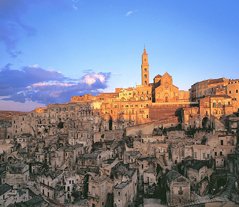 The European Capital of Culture is a title given to a European city for an interval of one year during which the city will organize cultural events showcasing both the city and its role in Europe. Established in 1985, this distinction aims to promote European unity. The title is an opportunity for European cities to gain international attention as well as obtain possible economic and social benefits. For the year 2019, an international panel of cultural experts have chosen the proposals of Matera, Italy and Plovdiv, Bulgaria. Several cities in Italy have been awarded this distinction before (such as Florence, Bologna, and Genoa) but this is the first time a city in southern Italy has been chosen by the panel, and the honor is long overdue.
The European Capital of Culture is a title given to a European city for an interval of one year during which the city will organize cultural events showcasing both the city and its role in Europe. Established in 1985, this distinction aims to promote European unity. The title is an opportunity for European cities to gain international attention as well as obtain possible economic and social benefits. For the year 2019, an international panel of cultural experts have chosen the proposals of Matera, Italy and Plovdiv, Bulgaria. Several cities in Italy have been awarded this distinction before (such as Florence, Bologna, and Genoa) but this is the first time a city in southern Italy has been chosen by the panel, and the honor is long overdue.
Matera is a charming city in the Basilicata region of southern Italy. It is known as “the Subterranean City” because the historical part of the city is comprised of ancient cave dwellings called the “Sassi di Matera” (Stones of Matera). There are two main stones present and they are named the Sasso Caveoso and the Sasso Barisano. The Sassi were declared a UNESCO World Heritage Site in 1993, and were given this honor because they represent unique dwellings where inhabitants of Matera have lived for more than 9,000 years. Matera was the first city in southern Italy to be included as a World Heritage Site and this shows that it is a truly outstanding and innovative city.
Inside Matera, one can observe many ancient churches carved from volcanic rock found in the surrounding area. There are also many underground churches inside simple caves as well as complex caves networks that feature meditation areas used by monks. In addition, Matera’s rocky landscape is unique because it creates a primitive backdrop which lends itself well to art and film. In fact, many filmmakers such as Pier Paolo Pasolini and Mel Gibson have chosen Matera to represent ancient Jerusalem in their films.
By earning this distinction, Matera has continued along its path of being an innovative city in southern Italy and this will foster further innovation and progress in the future.